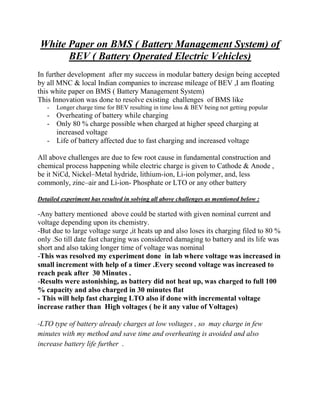White paper on Battery Management System for BEV ( Battery Operated Elec . Vehicles)
- 1. White Paper on BMS ( Battery Management System) of BEV ( Battery Operated Electric Vehicles) In further development after my success in modular battery design being accepted by all MNC & local Indian companies to increase mileage of BEV ,I am floating this white paper on BMS ( Battery Management System) This Innovation was done to resolve existing challenges of BMS like - Longer charge time for BEV resulting in time loss & BEV being not getting popular - Overheating of battery while charging - Only 80 % charge possible when charged at higher speed charging at increased voltage - Life of battery affected due to fast charging and increased voltage All above challenges are due to few root cause in fundamental construction and chemical process happening while electric charge is given to Cathode & Anode , be it NiCd, Nickel–Metal hydride, lithium-ion, Li-ion polymer, and, less commonly, zinc–air and Li-ion- Phosphate or LTO or any other battery Detailed experiment has resulted in solving all above challenges as mentioned below : -Any battery mentioned above could be started with given nominal current and voltage depending upon its chemistry. -But due to large voltage surge ,it heats up and also loses its charging filed to 80 % only .So till date fast charging was considered damaging to battery and its life was short and also taking longer time of voltage was nominal -This was resolved my experiment done in lab where voltage was increased in small increment with help of a timer .Every second voltage was increased to reach peak after 30 Minutes . -Results were astonishing, as battery did not heat up, was charged to full 100 % capacity and also charged in 30 minutes flat - This will help fast charging LTO also if done with incremental voltage increase rather than High voltages ( be it any value of Voltages) -LTO type of battery already charges at low voltages , so may charge in few minutes with my method and save time and overheating is avoided and also increase battery life further .
- 2. - All other battery types(NiCd, NickelMetal hydride, lithium-ion, Li-ion polymer ) can be done with increasing Voltage with small incremental value and see that results are amazing .Innovators can try this Innovation of incremental Voltage and affirm my results to start working on new BMS system with timer to give small voltage increment for stipulated given of time ( it can be 15,30 ,45 or 60 minute )depending upon time available for charging your BEV . Reaching from (X) Voltage to (2 X) in 15 ,30, 45, or 60 minutes ( Time depends upon BMS system and customers requirement to charge BEV) - This small change in charging pattern by incremental voltage will solve BEV challenges faced till today . - I am sure all innovators ,manufacturers and charger BMS system makers will adopt this new system to cater to market with more full proof method of fast charging without worrying about overheating , 80 % charging only , longer time to charge and shorter battery life . If anybody has more suggestion to this innovation is welcomed ,as my purpose of this test was to solve all pending challenges with BMS to help market BEV with more better technology to replace fossil fuel vehicles and make our mother earth free of pollution .


